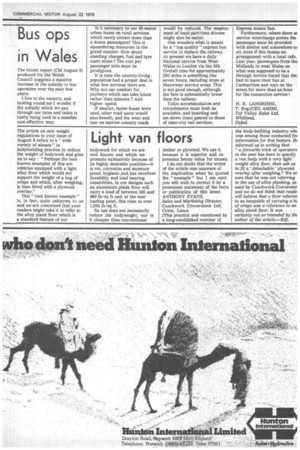Bus ops in Wales
Page 43

If you've noticed an error in this article please click here to report it so we can fix it.
The recent report (CM August 8) produced for the Welsh Council suggests a massive increase in the subsidy to bus operators over the next few years.
I live in the country, and looking round me I wonder if the subsidy which we pay through our rates and taxes is really being used in a sensible cost-effective way.
The article on new weight regulations in your issue of August 8 refers to a " wide variety of abuses" in ,bodybuilding practice to reduce the weight of bodywork and goes on to say : "Perhaps the best known examples of this are vehicles equipped with a light alloy floor which would not support the weight of a bag of crisps and which, after weighing, is then fitted with a plywood overlay."
This "best known example" is, in fact, quite unknown to us • and we are concerned that your readers might take it to refer to the alloy plank floor which is a standard feature of our Is it necessary to use 45-seater urban buses on rural services which rarely attract more than a dozen passengers? This is squandering resources in the grand manner. How about standing charges, fuel and tyre costs alone ? The cost per passenger mile must be prodigious.
It is time the country-living population had a proper deal in what few services there are. Why not car comfort for journeys which can take hours rather than minutes ? And higher speed.
If smaller, faster buses were used, other road users would also benefit, and the wear and tear on narrow country roads would be reduced. The employment of local part-time drivers might also be easier.
One wonders what is meant by a "top quality" express bus service to replace the railway. At present we have a daily National service from West Wales to London via the M4. Overall time for approximately 250 miles is something like seven hours, including stops at Motorway service areas. This is not good enough, although the fare is substantially lower than the railway.
Toilet accommodation and refreshments must both be available, and boarding and set-down times geared to those of inter-city rail services. Express means fast.
Furthermore, where there at service interchange points the passenger must be provided with shelter and somewhere to sit, even if this means an arrangement with a local cafe. Last year, passengers from the Midlands to west Wales on what was supposed to be a through service found that the; had to leave their bus at Carmarthen and wait on the street for mare than an hour for the connection service !












































































